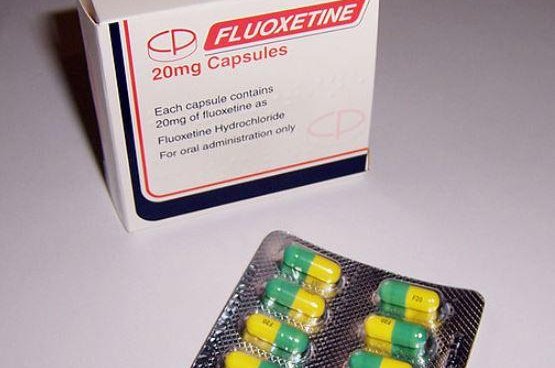Twenty-one common antidepressants, including fluoxetine, were all more effective at reducing symptoms of acute depression than a placebo, according to a study of 522 drug trials. Fluoxetine, which includes the brand name Prozac, was among the least effective. Photo by
Lanfear's Bane/Wikimedia Commons
Feb. 22 (UPI) -- Antidepressants are more successful at reducing depression symptoms among adults than a placebo, according to an analysis of more than 500 drug trials.
The study found 21 common antidepressants were all more effective at reducing symptoms of acute depression than dummy pills, according to a report published Wednesday in The Lancet, which researchers say confirms the efficacy of the drugs for treatment.
"This meta-analysis finally puts to bed the controversy on anti-depressants, clearly showing that these drugs do work in lifting mood and helping most people with depression," Professor Carmine Pariante, of the Royal College of Psychiatrists, told the BBC.
Researchers reviewed data from 522 clinical trials involving 116,477 adults who received short-term treatment of acute depression over eight weeks between 1979 and 2016. Seventy-eight percent of them were funded by pharmaceutical companies. Among the trials, 9 percent were rated as having high risk of bias, 78 percent as having moderate risk of bias and 18 percent as having low risk of bias.
"Our study brings together the best available evidence to inform and guide doctors and patients in their treatment decisions," Dr. Andrea Cipriani, of Oxford University's Department of Psychiatry, said in a release. "Our findings are relevant for adults experiencing a first or second episode of depression -- the typical population seen in general practice."
The drugs ranged in effectiveness from one-third more effective than a placebo to more than twice as effective.
Aside from analyzing the trials, the authors then contacted pharmaceutical companies, original study authors and regulatory agencies for additional information.
In the trials, 87,052 participants were randomly assigned to receive a drug and 29,425 to receive placebo. Most of the patients had moderate to severe depression. Trials with patients who also had bipolar depression, symptoms of psychosis or treatment resistant depression were excluded.
With one exception, clomipramine, all of the drugs tested in the trials were found to be more effective than a placebo.
The most effective drugs were agomelatine, amitriptyline, escitalopram, mirtazapine, paroxetine, venlafaxine and vortioxetine. The least effective were fluoxetine, fluvoxamine, reboxetin and trazodone.
Researchers also examined tolerability with the best agomelatine, citalopram, escitalopram, fluoxetine, sertraline and vortioxetine. Least tolerable were amitriptyline, clomipramine, duloxetine, fluvoxamine, reboxetine, trazodone and venlafaxine.
'"Antidepressants can be an effective tool to treat major depression, but this does not necessarily mean that antidepressants should always be the first line of treatment," Cipriani said. "Medication should always be considered alongside other options, such as psychological therapies, where these are available. Patients should be aware of the potential benefits from antidepressants and always speak to the doctors about the most suitable treatment for them individually."















